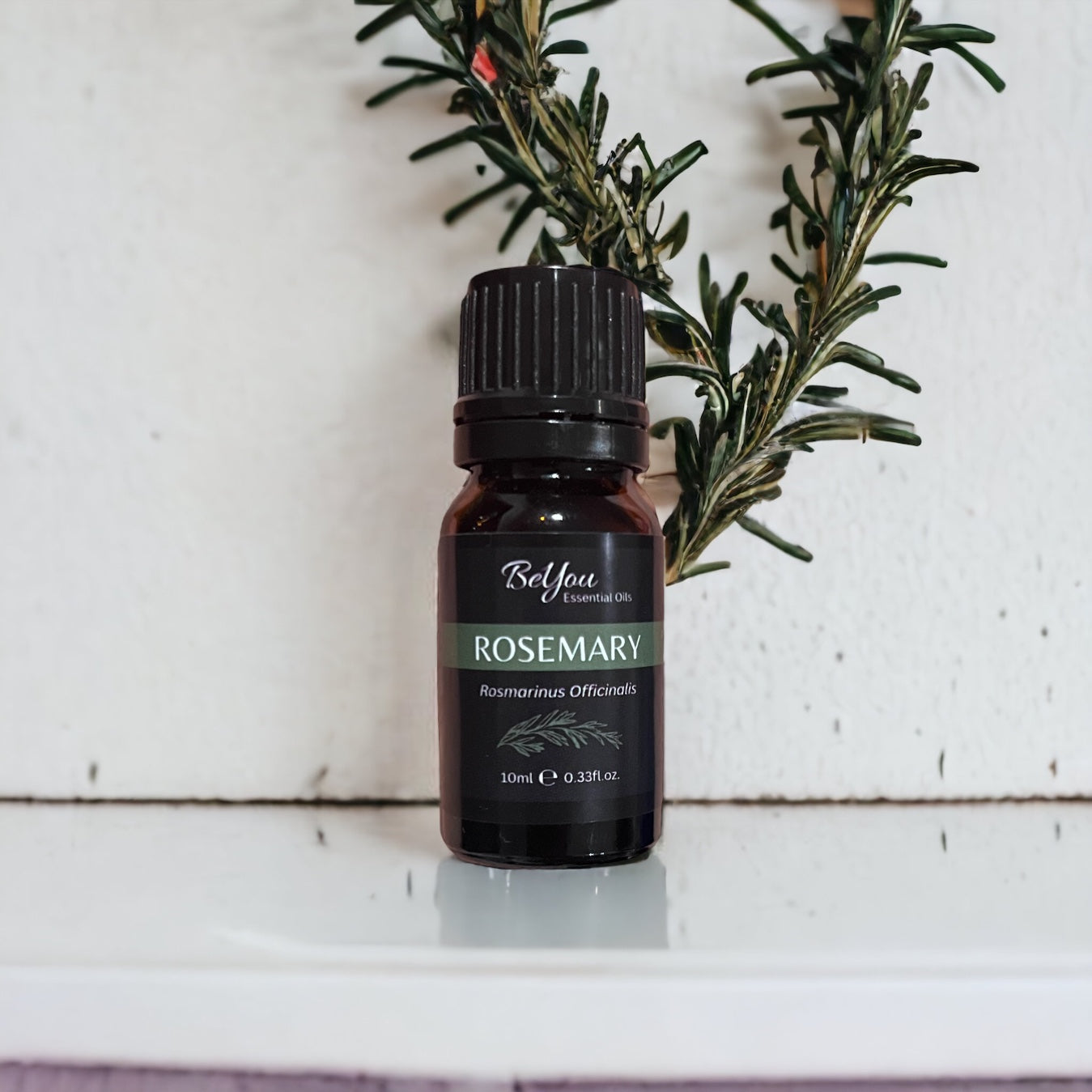Rosemary Pure Essential Oil
Rosemary Pure Essential Oil
Low stock: 4 left
Couldn't load pickup availability
DESCRIPTION
DESCRIPTION
Rosemary Essential Oil is derived from the aromatic herb Rosmarinus officinalis. It offers a multitude of benefits for both the body and mind, making it a popular choice in aromatherapy.
BENEFITS:
- Mental clarity and focus: Rosemary oil is known for its ability to enhance mental alertness, improve concentration, and promote clarity of thought. It can be beneficial during times of study, work, or when you need a cognitive boost.
- Respiratory support: With its invigorating aroma, Rosemary oil can help alleviate respiratory congestion and promote clear breathing. It is often used in inhalation blends or diffused to support respiratory health.
- Revitalizing and energizing: The uplifting properties of Rosemary oil make it a fantastic choice for combatting fatigue, mental exhaustion, and promoting an overall sense of vitality and well-being.
- Hair and scalp care: Rosemary oil is renowned for its ability to promote healthy hair growth and maintain a balanced scalp. It is commonly used in hair care products to improve the appearance and strength of hair strands.
PRODUCT DETAILS
PRODUCT DETAILS
Botanical Name: Rosmarinus Officinalis (Rosemary) Leaf Oil
Derived from: Leaves and flowers
Origin: Spain
Extraction: Steam Distilled essential Oil
Note: Middle
Aroma: Fresh, herbaceous, woody
- Vegan
- Non-GMO
- Not tested on animals
- Halal
- No carrier oils, 100% pure essential oil
Size: 10ml
DIRECTIONS FOR USE
DIRECTIONS FOR USE
HOW TO USE:
- Diffusion: Add 4-6 drops of Rosemary oil to a diffuser filled with water and let the invigorating aroma fill the room. This promotes mental clarity, concentration, and an uplifting atmosphere.
- Topical application: Dilute Rosemary oil in a carrier oil such as jojoba or coconut oil at a recommended dilution of 2-3%. Apply the diluted mixture to the desired area for massage or targeted benefits, such as scalp or joint support.
BLENDS WITH
BLENDS WITH
BLENDS WELL WITH:
Rosemary Essential Oil blends harmoniously with various other essential oils, including:
- Peppermint: for an invigorating and refreshing blend.
- Lemon: for a bright and uplifting aroma.
- Lavender: for a calming and balancing effect.
- Eucalyptus: for respiratory support and an invigorating scent.
- Clary Sage: for a soothing and herbal combination.
SAFETY PRECAUTION
SAFETY PRECAUTION
SAFETY PRECAUTIONS:
- Perform a patch test before using Rosemary oil topically to check for any potential skin sensitivities or allergies.
- Avoid using Rosemary oil if you are pregnant or breastfeeding without consulting a healthcare professional.
- It is advisable to consult with a qualified aromatherapist or healthcare practitioner before using Rosemary oil if you have any specific health concerns or medical conditions.
- Keep Rosemary essential oil out of the reach of children and store it in a cool, dry place, away from direct sunlight.
Note: Rosemary oil should not be ingested unless under the guidance of a qualified healthcare professional.

FAQs
-
What are essential oils?
Essential oils are highly concentrated plant extracts that capture the natural fragrance and beneficial properties of plants. They are typically obtained through processes like steam distillation or cold-pressing of various plant parts such as leaves, flowers, stems, or roots. Essential oils are known for their aromatic qualities and are commonly used in aromatherapy, personal care products, and natural remedies. -
How are essential oils used?
Essential oils can be used in several ways. Here are a few common methods:
- Aromatherapy: Inhalation of essential oils using diffusers, steam inhalation, or adding a few drops to a bowl of hot water.
- Topical application: Diluting essential oils with carrier oils (such as coconut or jojoba oil) and applying them to the skin for massage or skincare purposes.
- Internal consumption: Some essential oils are safe for internal use, but it is crucial to consult a qualified professional before ingesting them, as not all oils are suitable for internal consumption.
-
What are the potential benefits of essential oils?
Essential oils are believed to offer a range of potential benefits, but it's important to note that scientific research on their effectiveness is still evolving. Some commonly cited benefits include:
- Aromatherapy for relaxation, stress relief, and mood enhancement.
- Skin and hair care: Many essential oils are used in skincare products for their potential antimicrobial, anti-inflammatory, and soothing properties.
- Natural cleaning: Some essential oils possess antimicrobial properties and can be used as natural alternatives for household cleaning products.
- Potential respiratory support: Certain essential oils, such as eucalyptus or peppermint, are known for their potential respiratory benefits when inhaled.
-
Are there any risks or precautions associated with essential oils?
While essential oils are generally safe when used properly, there are a few important considerations:
- Skin sensitivity: Some essential oils can cause skin irritation or allergic reactions, especially when used undiluted or on sensitive skin. Always perform a patch test and dilute oils before applying them topically.
- Inhalation precautions: Not all essential oils are safe for inhalation, especially for individuals with respiratory conditions or sensitivities. Certain oils may trigger allergies or respiratory distress.
- Internal use: Internal consumption of essential oils should only be done under the guidance of a qualified professional. Many oils are toxic when ingested, and improper use can lead to adverse effects.
- Pregnancy and children: Some essential oils are not safe for use during pregnancy or on young children. It's crucial to consult healthcare professionals or certified aromatherapists for guidance in these situations.
Remember, it's always wise to consult with a healthcare professional or aromatherapist before using essential oils, especially if you have any underlying health conditions or concerns.
5. What is your extraction/collection process?
Refer to our Blogs for a detailed explanation about our Extraction and Collection process.
6. Are the plants sprayed with any chemicals which may lead to being included in the process of collecting the oil?
No, as our suppliers are certified there is no chemicals or pesticides being used on the plants, which are confirmed as each batch is analysed by microbiologist for the presents of bio-hazardous micro-organisms (such as bacteria and mould), heavy metals and pesticides.
7. Are the oils 100% organic as well as not diluted with fragrances or anything other than the plant itself?
Yes, all our Essential and Absolute oils are 100% organic, pure, with no carrier oils added, or fragrances.



